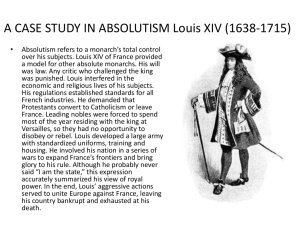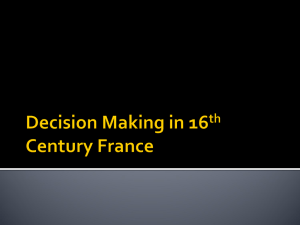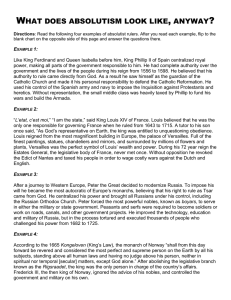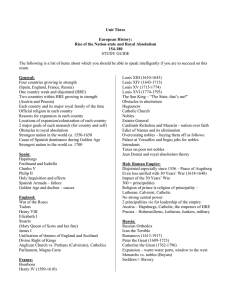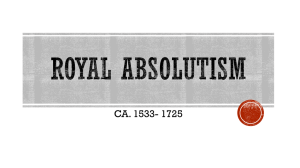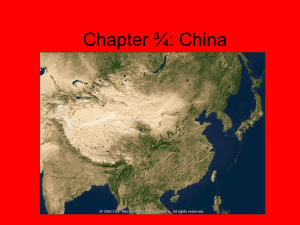Chapter 15 Review Answers.docx
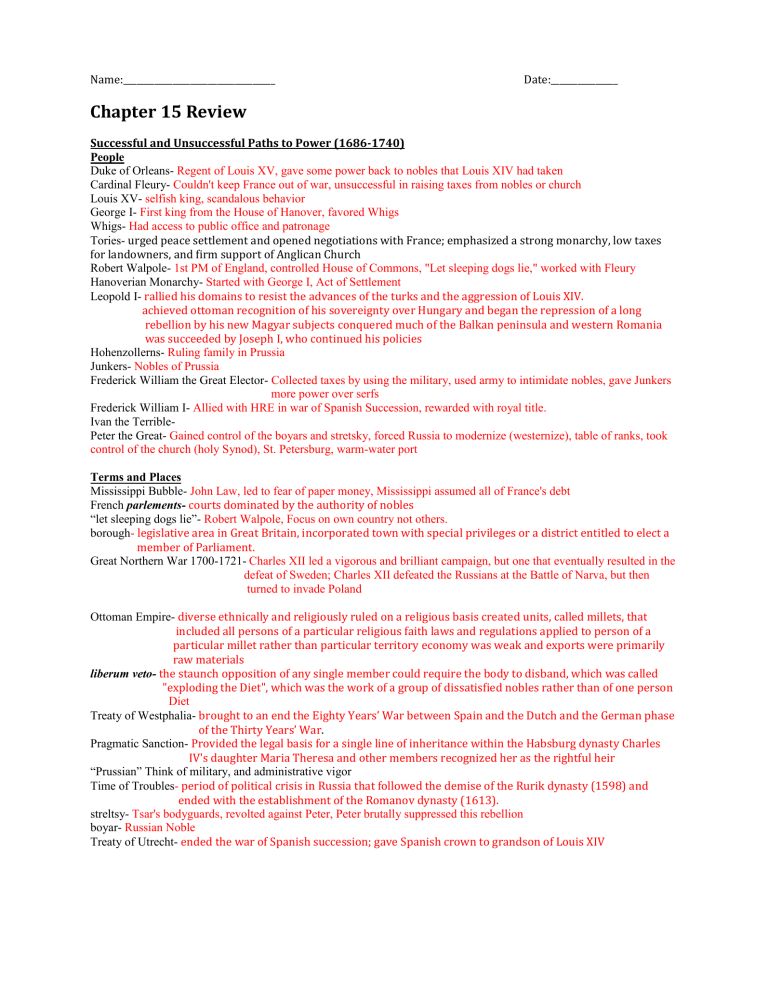
Name:__________________________________
Chapter 15 Review
Successful and Unsuccessful Paths to Power (1686-1740)
Date:_______________
People
Duke of Orleans- Regent of Louis XV, gave some power back to nobles that Louis XIV had taken
Cardinal Fleury- Couldn't keep France out of war, unsuccessful in raising taxes from nobles or church
Louis XV- selfish king, scandalous behavior
George I- First king from the House of Hanover, favored Whigs
Whigs- Had access to public office and patronage
Tories- urged peace settlement and opened negotiations with France; emphasized a strong monarchy, low taxes for landowners, and firm support of Anglican Church
Robert Walpole- 1st PM of England, controlled House of Commons, "Let sleeping dogs lie," worked with Fleury
Hanoverian Monarchy- Started with George I, Act of Settlement
Leopold I- rallied his domains to resist the advances of the turks and the aggression of Louis XIV.
achieved ottoman recognition of his sovereignty over Hungary and began the repression of a long
rebellion by his new Magyar subjects conquered much of the Balkan peninsula and western Romania
was succeeded by Joseph I, who continued his policies
Hohenzollerns- Ruling family in Prussia
Junkers- Nobles of Prussia
Frederick William the Great Elector- Collected taxes by using the military, used army to intimidate nobles, gave Junkers
more power over serfs
Frederick William I- Allied with HRE in war of Spanish Succession, rewarded with royal title.
Ivan the Terrible-
Peter the Great- Gained control of the boyars and stretsky, forced Russia to modernize (westernize), table of ranks, took control of the church (holy Synod), St. Petersburg, warm-water port
Terms and Places
Mississippi Bubble- John Law, led to fear of paper money, Mississippi assumed all of France's debt
French parlements- courts dominated by the authority of nobles
“let sleeping dogs lie”- Robert Walpole, Focus on own country not others. borough - legislative area in Great Britain, incorporated town with special privileges or a district entitled to elect a
member of Parliament.
Great Northern War 1700-1721Charles XII led a vigorous and brilliant campaign, but one that eventually resulted in the
defeat of Sweden; Charles XII defeated the Russians at the Battle of Narva, but then
turned to invade Poland
Ottoman Empire- diverse ethnically and religiously ruled on a religious basis created units, called millets, that
included all persons of a particular religious faith laws and regulations applied to person of a
particular millet rather than particular territory economy was weak and exports were primarily
raw materials liberum veto- the staunch opposition of any single member could require the body to disband, which was called
"exploding the Diet", which was the work of a group of dissatisfied nobles rather than of one person
Diet
Treaty of Westphalia- brought to an end the Eighty Years’ War between Spain and the Dutch and the German phase of the Thirty Years’ War .
Pragmatic Sanction- P rovided the legal basis for a single line of inheritance within the Habsburg dynasty Charles
IV's daughter Maria Theresa and other members recognized her as the rightful heir
“Prussian” Think of military, and administrative vigor
Time of Troubles - period of political crisis in Russia that followed the demise of the Rurik dynasty (1598) and
ended with the establishment of the Romanov dynasty (1613).
streltsy- Tsar's bodyguards, revolted against Peter, Peter brutally suppressed this rebellion boyar- Russian Noble
Treaty of Utrecht- ended the war of Spanish succession; gave Spanish crown to grandson of Louis XIV
Topics
Waning powers of the late 17th and early 18th centuries
Decline of Spanish power-
- had no exports to pay for imports (except for wool)
- financed imports by using the gold and silver mined in its new world empire
- was uncertain because new world ships could be captured by pirates
- political life weak
- royal gov't couldn't operate without the help of local nobles and church
- spain suffered a series of foreign policy reverses that harmed domestic prestige of gov't
Decline of Dutch power
Difference between Whigs and Tories
House of Commons
British system of government and the rest of Europe
Comparing Western Europe with Central and Eastern Europe in the 18th century
Rise of Russia and Prussia
Polish instability
Ineffectiveness of the Polish legislature
Hapsburgs difficult lands to rule
Peter the Greats’ reforms

